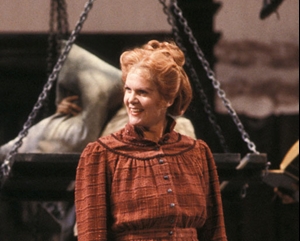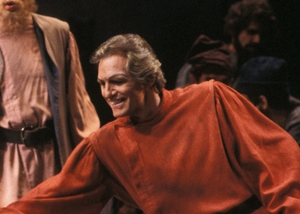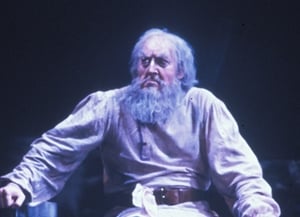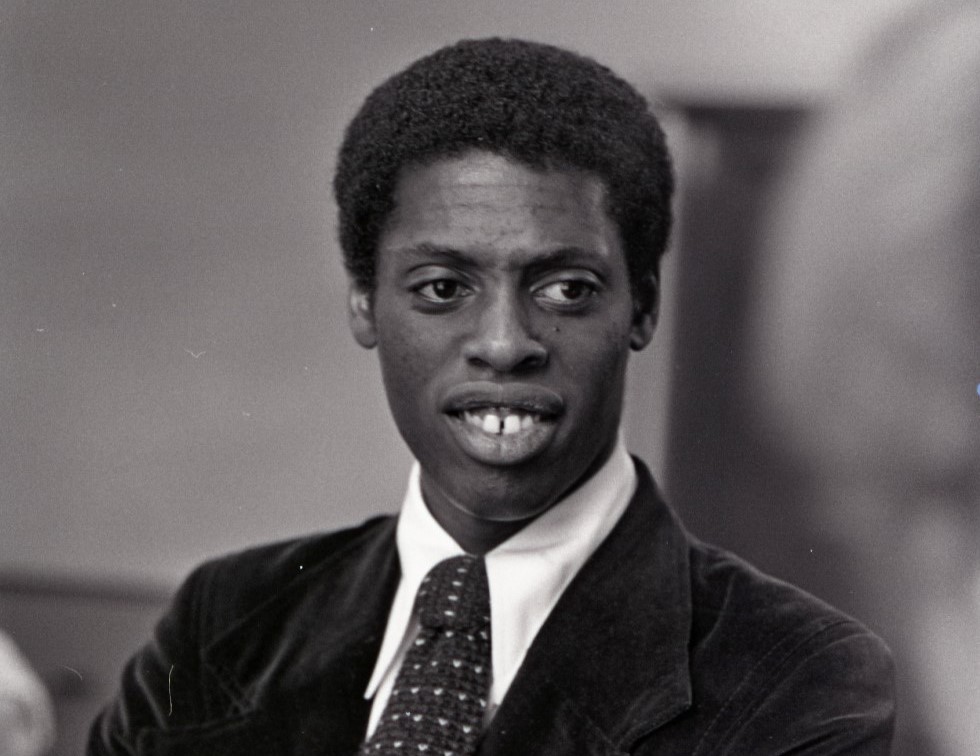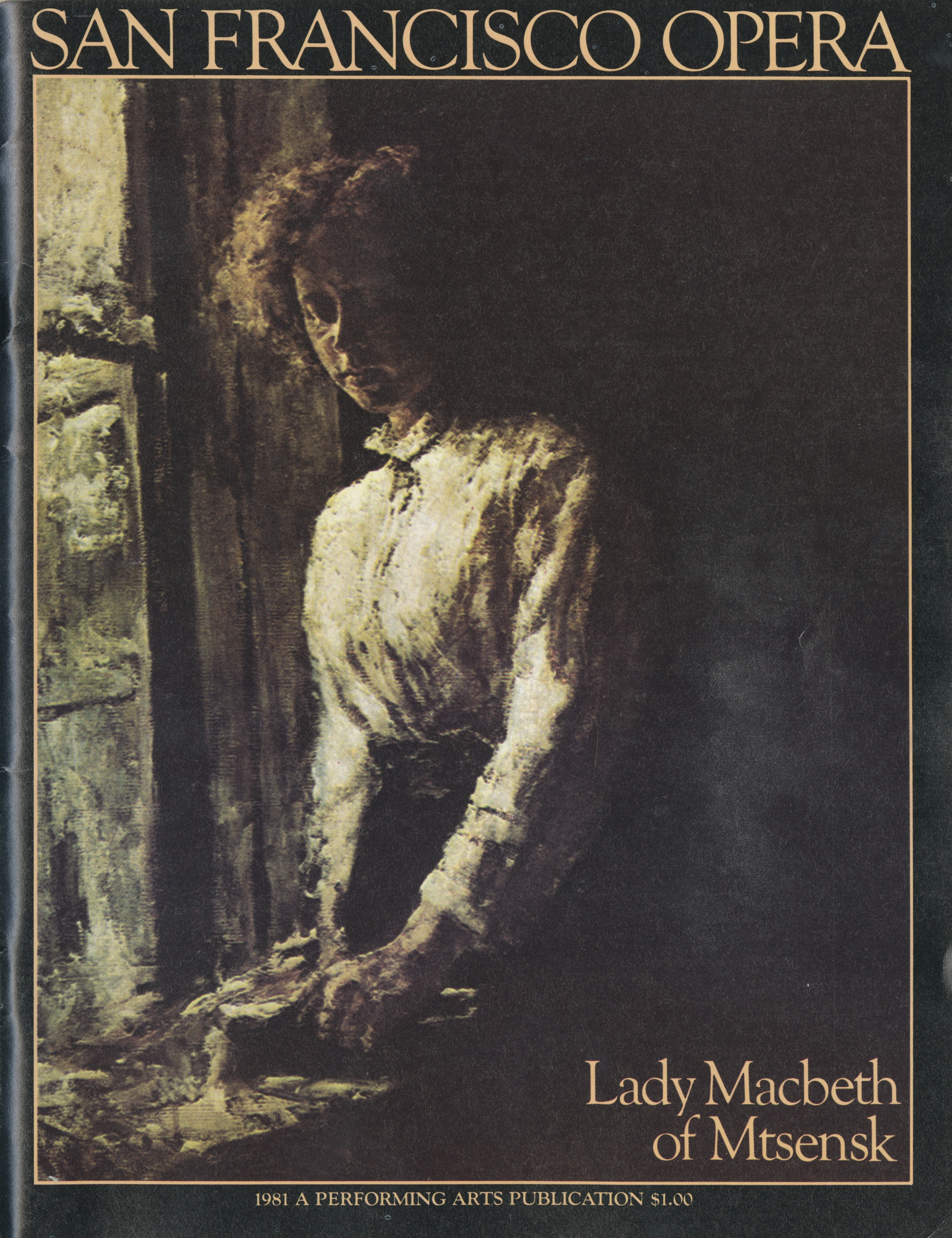By Harlow Robinson
Shostakovich's only full-length opera offers a case history of the interaction between politics and art in the Soviet Union.
Few composers in our century have received more attention—both wanted and unwanted—than Soviet composer Dmitri Shostakovich. By the time he died at age 68, in August 1975, he had been showered with honors both at home (he was the first Soviet musician to be named a "Hero of Socialist Labor") and abroad. He was rapidly becoming the most frequently performed 20th-century symphonic composer in the world. An enormously prolific, nearly obsessed, worker, he produced 15 weighty symphonies and 15 complex string quartets, not to mention concertos, film scores, songs, piano music, cantatas, and incidental music of all kinds —and, of course, Lady Macbeth of Mtsensk, his lone full-length opera and one of the very few operas written since 1920 to become truly popular in the international repertoire.
But Shostakovich has been celebrated almost as much for political reasons as for musical ones. Indeed, a Soviet musician friend joked to me not long ago, as we walked bundled-up along a frozen Moscow street, that Soviet newspapers had delayed in announcing Shostakovich's death because a fierce political debate was raging among the editors over whether to call him a "great" or merely "outstanding" Soviet composer. The anecdote is unverifiable, one of those countless politically motivated jokes with which Soviet citizens poke fun at their singularly humorless government, but is still an accurate reflection of the sensitive political position that Shostakovich occupied throughout his life—and even after death. The furor caused two years ago by the publication in America of Testimony, Shostakovich's supposed memoirs, only made that position more uncertain.
It is difficult for most Americans—or for most Westerners—to understand how composers, those apolitical and cerebral creatures who, in most societies have as much to do with politics as Parliament does with the state of the modern novel, can, in Soviet Russia, be subject to political control and be expected to produce music adhering to the party line of the moment. What does that mean? ls a C minor chord less ideologically correct than a C major chord? As recently as November 1980, at the Sixth All-Union Congress of Composers (all Soviet composers, if they hope to be performed or published, must join the Composers' Union) in Moscow, seven living composers were sharply criticized for excessive infatuation with "Western bourgeois" techniques of composition—serialism, electronics—that appeal to a supposed artistic elite rather than to the "broad masses" of Soviet listeners.
Shostakovich's career, especially since it stretched through the regimes of Stalin, Khrushchev, and Brezhnev, and since it was spent entirely in Russia, is an instructive case history in the interaction of politics and art in the Soviet Union. One of the more illustrative and bizarre chapters in that history is the matter of Shostakovich’s operatic masterpiece, Lady Macbeth of Mtsensk (also called, at various times and for varying reasons, Katerina Ismailova). The opera's political fate, like the composer's, has zigged and zagged with a willful, at times capricious, violence worthy of the heroine's namesake.
When Shostakovich began writing Lady Macbeth in 1930 at age 24, he was already a famous composer. His First Symphony, first performed in 1926, had been an immediate success, and he was hailed by enthusiastic critics as the first "Soviet" composer. His Second Symphony, given 18 months later, was less successful, but began what was to become a habit with Shostakovich: politically programmatic symphonies. The poet Bezimensky provided verses for the Second Symphony that clearly demonstrate Shostakovich's acute awareness of the political situation in which he was living:
October! — the happiness of fields and working tables.
It is the banner of living generations.
October.
The Commune.
And Lenin.
Similarly, his Third Symphony was dedicated to international May Day. In fact, Shostakovich was always aware of political realities. and was never an advocate of art for art's sake. as his comments in an interview published in The New York Times in December 1931 indicate:
There can be no music without ideology . . . We, as revolutionaries, have a different conception of music. Lenin himself said that "music is a means of unifying broad masses of people." It is not a leader of masses, perhaps, but certainly an organizing force! For music has the power of stirring specific emotions . . . Music is no longer an end in itself, but a vital weapon in the struggle. Because of this, Soviet music will probably develop along different lines from any the world has ever known.
From the very beginning, Shostakovich was an engaged artist; it is misleading to portray him, as many Western critics have done, as an apolitical artist with his head in the musical sand. He may have disagreed with the Soviet cultural bureaucracy on political principles—though he was usually silent about such differences—but he never really objected to the idea that music was, in its own way, political.
The 1920s—which coincided with Shostakovich's own twenties—were a period, especially in retrospect, of relative freedom in newly Soviet Russia. The chaos and devastation of the 1917 Bolshevik Revolution and the long civil war that followed had led Lenin to declare a period of free enterprise (The New Economic Policy) intended to revitalize the struggling economy. It was a time of wheeler-dealing, speculation and corruption. Artists of all kinds, exuberant at the prospect of a new world opening before their eyes, freed from centuries of Tsarist stupidity, broke into scores of political and artistic factions, each issuing manifestoes, one more enthusiastic than the other. Lenin's death in 1924, while unexpected, did not immediately change this fluid situation. A scramble for power ensued in which Joseph Stalin, a onetime seminarian turned bureaucratic megalomaniac, eventually gained the upper hand. For the moment the more pressing questions of national survival—industrialization, collectivization, foreign policy—prevented Stalin and his disciples from paying much attention to artistic issues.
That Shostakovich's only other completed opera, The Nose, could have been produced in Leningrad in 1930 is proof that the situation in the arts was still relatively open and free. This eccentric and sarcastic one-act work, based very loosely on a short story by 19th-century Russian writer Nikolai Gogol in which a civil servant wakes up one morning to find his nose gone and running around town with fashionable ladies, is typical of the sometimes wild experimentation in which writers, composers and visual artists indulged until the early 1930s. The opera, which has no coherent story line, has 78 characters. The part of the nose is written to be sung with stopped-up nostrils. The music is rarely tonal, consisting instead of a weird mixture of recitative, screaming and rude noises. The orchestra is chamber size and heavy on percussion effects. After this 1930 production, The Nose dropped out of sight for decades, but reappeared a few years ago in Moscow in a witty and virtuoso production at the Musical Chamber Theater, where it is currently in the repertoire.
Encouraged by his early success, Shostakovich set to work on a serious full-length opera, which he intended as the first in an operatic tetralogy on Russian women. Lady Macbeth of Mtsensk, taken from a short story by 19th-century Russian writer Nikolai Leskov, was to portray the woman of 1840; the other three would be concerned with women of 1860, 1917, and the Soviet present. Shostakovich never got beyond 1840.
Lady Macbeth was finished by 1932, the same year the composer married Nina Varzar, and was first staged in Leningrad on January 22, 1934, followed by a production in Moscow on January 24. (In Leningrad the opera was called Lady Macbeth of the Mtsensk District, but in Moscow it was called from the beginning Katerina Ismailova, after the heroine.) The critics were universally enthusiastic. Lady Macbeth was called "the result of the general success of Socialist construction, of the correct policy of the Party," an opera that "could have been written only by a Soviet composer brought up in the best traditions of Soviet culture." Samuil Samosud, the distinguished conductor who led the premiere, went even further: "I declare Lady Macbeth a work of genius, and I am convinced that posterity will confirm this estimate. One cannot help feeling proud that, in a Soviet musical theater, an opera has been created that overshadows all that can possibly be accomplished in the operatic art of the capitalist world. Here, too, our culture has indeed not only overtaken, but surpassed the most advanced capitalist countries."
And yet backstage—offstage—the political ride was turning, flooding artistic fields. Stalin had now firmly consolidated himself in a position of total leadership. Freed from worrying about potential rivals, he turned his dictator's attention to other matters. The collectivization of Soviet agriculture, a bloody and often ruthless process of government takeover of private farms, begun in 1928, was already largely accomplished by the early 1930s. The first Five-year Plan, to determine the development and output of every sector of the Soviet economy, was followed in 1932 by the Second Five-year Plan. The chaos of Lenin's New Economic Policy gave way to a totalitarian approach that spread its control into every aspect of Soviet life, including art and artists.
As it turned out, 1932, the year Shostakovich finished Lady Macbeth, and 1934, the year it was first performed, were watershed years in the regimentation of music, literature, and art. During the 1920s writers, composers and artists, while encouraged to address themselves to the difficult issues of a developing socialist society, were more or less free to express themselves as they chose. Numerous organizations of artists were born, each with its own political—or even apolitical—line. In 1932, however, the Communist Party published a resolution—"On the Reconstruction of Literary and Artistic Organizations"—that signaled an end to diversity. Single, all-inclusive unions were to be established in each field of the arts; all "Soviet" artists would be required to belong.
The first of these to be established was the Union of Soviet Writers. Writers have always been the first to be regimented and punished throughout Soviet history; by comparison, composers have had it easy, probably because the undeniable technical basis of music is less comprehensible to cultural bureaucrats than the printed word. At the first All-Union Congress of Soviet Writers in 1934, various party and cultural figures impressed upon the assembled authors the need to write about issues that advanced the high cause of Soviet Communism. "Socialist Realism" was the new battle cry. But what was most sinister in the proceedings was a strident tone of intolerance; clearly, deviations from the doctrine would not be tolerated.
It took somewhat longer for the situation in music to crystallize. The two organizations of composers that had existed in the 1920s, the Russian Association of Proletarian Musicians and the Association for Contemporary Music, were replaced by the monolithic Union of Soviet Composers, which began to publish its own journal, Soviet Music, in 1933. It is still published today and is still the official mouthpiece of policy on music. Ironically, Shostakovich initially greeted the formation of the union with enthusiasm, as did most of his colleagues, since they saw in it an elimination of the petty in-fighting that had gone on in the preceding decade. and overlooked the inherent possibilities of regimentation. Socialist Realism now became the password for composers, too. The critic Gorodinsky defined musical Socialist Realism in this way in 1933:
The main attention of the Soviet composer must be directed towards the victorious, progressive principles of reality, towards all that is heroic, bright, and beautiful. This distinguishes the spiritual world of Soviet man and must be embodied in musical images full of beauty and strength. Socialist Realism demands an implacable struggle against folk negating modernistic directions that are typical of the decay of contemporary bourgeois art, against subservience and servility towards modern bourgeois culture.
Heady words, these—and vague ones. What did they mean in practice? How could the new policy be applied to individual compositions? The official response to Lady Macbeth would, unfortunately for Shostakovich, provide some of the answers.
Lady Macbeth was very popular in Moscow and Leningrad in the two years following its premiere. It had an unusually large number of performances for a new opera: 83 in Leningrad and 97 in Moscow. It had also become known abroad, with American performances in Cleveland, New York (at the Metropolitan), and Philadelphia in early 1935, and in European capitals during the next few seasons. Shostakovich's fame and prestige grew; he was not yet 30.
And then suddenly, with the terrifying speed that was to become so frighteningly familiar in succeeding years, Shostakovich's star fell. Stalin attended a performance of the opera. There is some disagreement as to exactly when he went to see Lady Macbeth at the StanislavskyNemirovich-Danchenko Theater in Moscow: either in late December 1935 or in early January 1936. There is no disagreement that he didn't like what he saw. So little did he like it that soon after, on January 28, 1936, an unsigned article entitled "Chaos Instead of Music" appeared in Pravda directly attacking Shostakovich and his opera. That the article appeared in Pravda, which almost never comments on music in any way, only indicates how important Stalin and his entourage considered the issue.
"From the first moment, the listener is shocked by a deliberately dissonant, confused stream of sound," the article proclaimed. "Fragments of melody, embryonic phrases appear—only to disappear again in the din, the grinding and the screaming . . . This music is built on the basis of rejecting opera . . . The danger of this trend to Soviet music is clear . . . And 'love' is smeared all over the opera in the most vulgar manner. The merchant's double bed occupies the central position on the stage. On it all ‘problems' are solved . . .“
The opera was immediately withdrawn from the repertoire; it would return to the Soviet stage only in 1962. Shostakovich was transformed from prodigy to prodigal son in the course of a day.
Why was Stalin so offended by Lady Macbeth, which had already been running for two years? There are several interpretations. Stanley Krebs, author of Soviet Composers and the Development of Soviet Music, believes that "arch-puritan Stalin was grossly offended by the sexuality of the work and, musically, by the rape scene, whose brilliantly realistic orchestral accompaniment led one Western writer to coin the word 'pornophony.' "It is true that the 1930s were a period of "new respectability" in Soviet life. After the political and sexual experimentation of the 1920s, Soviet society was becoming more conservative, conventional, and self-conscious. It is also possible that Stalin was showing his true xenophobic colors. Since the opera had become so popular in the decadent bourgeois West, there must be something wrong with it, as the Pravda article said: "Lady Macbeth enjoys great success with audiences abroad. Is it not because the opera is absolutely unpolitical and confusing that they praise it? ls it not explained by the fact that it tickled the perverted tastes of the bourgeoisie with its fidgety, screaming, neurotic music . . .?”
Another interpretation, more plausible in my view, cites developments in the domestic political climate. On December 1, 1934, Kirov, mayor of Leningrad (after whom the Kirov Theater was named) was assassinated on the orders of Stalin, who feared his power. With this murder began the era of the purges that came to a hysterical climax in the years just preceding World War II. Stalin's response to Lady Macbeth would, then, be simply a reflection of the tightening political situation, the squeezing out of any incipient dissent.
It is also entirely possible that Stalin and his cultural henchmen seized upon Lady Macbeth as a test case proving state control over the arts, an opportunity to state more clearly what was expected of Soviet creative workers. That Shostakovich was world-famous would, in this sense, only be an asset: by cracking down on him, the Soviet government would make an international statement of intentions. Supporting this view is the fact that at the same time that Shostakovich and Lady Macbeth were criticized, another composer and his opera were praised.
Around the same time he saw Lady Macbeth, Stalin also saw Quiet Flows the Don by Ivan Dzerzhinsky, based on the epic novel of the same name by Mikhail Sholokhov. a basically optimistic tale of the coming of Soviet rule in rural southern Russia. Its characters are much more positive and "Soviet" than the brooding, destructive bourgeois types depicted in Lady Macbeth. Similarly. Dzerzhinsky's musical language is more simple and conventionally melodic, using folk tunes without the sarcastic twist that Shostakovich adds. It was held up as a model for what Soviet opera should be, and became the prototype for "song opera," based on clearly recognizable and separable tunes, preferably of folk origin.
Now that he had suddenly become an opera specialist, Stalin submitted his findings to other "specialists" called in for discussion on January 17, 1936. What we are looking for, he pronounced, is a "libretto with a Socialist topic, a realistic musical language with stress on a national idiom, and a positive hero typifying the new Socialist era." At first, in1934, when Lady Macbeth had been praised by Soviet critics, it had been justified on the grounds that it pointed out the failings of Tsarist Russia. That was no longer enough; one had to point out how wonderful Soviet Russia was.
Interestingly, most American critics got it backwards. They criticized Lady Macbeth for being too "leftist." William Henderson of The New York Sun stated that "Shostakovich is without doubt the foremost composer of pornographic music in the history of the opera," implying that Soviet composers are by nature pornographic. "So little was Socialist Realism understood at first," Gerald Abraham has rightly concluded, "that Lady Macbeth was accepted as an embodiment of it."
Nor had Stalin's men finished with Shostakovich. Two weeks later Pravda published yet another unsigned article attacking him, this time for his ballet, The Clear Stream, which described life on a mythical collective farm in the Caucasus. The music was deemed inappropriate for the setting. The continuation of the composer's hitherto productive career was suddenly cast into doubt.
Until the American firm Harper & Row published Testimony, the supposed memoirs of Shostakovich, two years ago we didn't really know how Shostakovich felt about the Lady Macbeth scandal. He was always reticent in his dealings with the press, and avoided political remarks on his few trips to the West. Even the validity of Testimony, which was compiled from Shostakovich's conversations in Russia with a Soviet musicologist and editor, Solomon Volkov, who later emigrated and now lives in New York, has been brought seriously into question. Volkov has been unable to explain entirely his mysterious relationship with the composer, and several scholars have pointed out sections of the book which are nearly identical to other previously published articles on Shostakovich. But neither has it been proven that the memoirs are definitely falsified, and there is no denying that they are fascinating reading. A number of my musician friends in the Soviet Union, including some who knew Shostakovich personally, while they have some questions about how Volkov obtained his information, told me they clearly recognized the composer's voice in Testimony.
With such a caveat in mind, this is how Shostakovich describes the Lady Macbeth scandal:
Two editorial attacks in Pravda in 10 days—that was too much for one man. Now everyone knew for sure that I would be destroyed. And the anticipation of that noteworthy event—at least for me—has never left me.
From that moment on I was stuck with the label "enemy of the people," and I don't need to explain what the label meant in those days. Everyone still remembers that.
I was called an enemy of the people quietly and out loud and from podiums. One paper made the following announcement of my concert: "Today there is a concert by enemy of the people Shostakovich." Or take this example: In those years my name wasn't welcomed enthusiastically in print unless, of course, it was used in a discussion about struggles against formalism. But it happened that I was assigned to review a production of Otello in Leningrad, and in my review I did not say ecstatic things about the tenor Nikolai Pechkovsky. I was swamped with anonymous letters saying in effect that I, enemy of the people, did not have long to tread on Soviet soil, that my ass's ears would be chopped off—along with my head.
It is difficult to assess how Shostakovich would have developed differently as a composer without this political shock so early in his career, but there is no question that he was affected. For one thing, he never wrote another opera, since he was perhaps afraid that he would once again miss the small target thrown up by the official musical establishment. He also withdrew his enormous Fourth Symphony, a wandering, difficult work in the style of late Mahler, from performance since he felt it would not help him at the moment. Though he finished the Fourth in May 1936, he recalled it after 10 rehearsals. It was performed for the first time in Russia only in 1961.
Instead of responding to the criticism in words, Shostakovich decided to reply in music. He set to work on a new symphony, his Fifth, "a work of clarity and affirmation," which would eventually become his most popular composition both at home and abroad. It acquired the ominous subtitle, "The Creative Reply of a Soviet Artist to Justified Criticism," not, it seems, from the composer himself, as has often been stated, but from a commentator in a Moscow newspaper. Shostakovich did not, apparently, object to the subtitle. With the Fifth Symphony, first performed almost two years after the Lady Macbeth incident, in October 1937, Shostakovich brilliantly re-entered active musical life. Universally acclaimed by official and unofficial critics, the symphony erased, for the most part, the taint left on Shostakovich’s reputation.
It is an enormous tribute to the strength of Shostakovich's belief in his talent that he dared to continue writing. A lesser man may well have faded away, or even asked to emigrate.
What the Lady Macbeth episode demonstrates is how arbitrary and inconsistent Soviet official policy towards the arts has been over the years. Lady Macbeth was singled out for criticism less for musical reasons than for the need, at that particular moment, to find a scapegoat. As Boris Schwarz has pointed out, the condemnation of Lady Macbeth was intended as a warning for all the arts, not only music. It was "the first clear demonstration of what Communist totalitarianism in art meant." It is this very capriciousness and uncertainty that so terrifies and debilitates Soviet artists; they never know when the situation will suddenly change.
Overall, official policy towards creative artists in Soviet Russia has significantly improved in the 45 years since the Lady Macbeth debacle. After abandoning opera for many years as too risky, Shostakovich eventually returned to revise Lady Macbeth, it was renamed Katerina Ismailova and a few—relatively minor—changes were made in orchestration and the vocal parts. In this revised form it returned to the StanislavskyNemirovich-Danchenko Musical Theater in Moscow on December 26, 1962. But even then it was shrouded in controversy. Only a week before, Shostakovich's Thirteenth Symphony, subtitled "Babi Yar" and dedicated to the Soviet Jews who died under Hitler, with strong texts by the poet Yevtushenko, had been performed for the first time and subjected to considerable criticism. Earlier in the same month Khrushchev had thrown a temper tantrum at an art exhibition that included some abstract works; the atmosphere was tense and uncertain.
But this time Katerina Ismailova prevailed and remained in the regular repertory. It was well received with small reservations, by most critics, one of whom was even moved to remark, rather forgetfully, that "There is in the revival of Katerina Ismailova yet another important significance. It is yet another fine achievement of our era, still another example of how firmly and irreversibly Leninist norms have again established themselves in Soviet artistic life."
Ironically. Katerina Ismailova (and Lady Macbeth) has gone on to gain a reputation as the quintessential "Soviet" opera. There was something familiar in the belated staging of Katerina at the Bolshoi Theater in Moscow, the Soviet Union's most prestigious theater which confers the ultimate stamp of approval, in December of last year. Only now, six years after the composer's death and 45 after his life was nearly destroyed by official stupidity, could this opera, recognized internationally as one of the greatest achievements of 20th-century music, return safely to the Soviet limelight.
Nor are the vilification and belated resurrection of Lady Macbeth/Katerina Ismailova an isolated instance in Soviet cultural history. Many other works of literature, music and art have been similarly "rehabilitated" years after their creators committed suicide, perished in concentration camps or died of frustration and madness, never having seen their best work printed, performed or exhibited. The poet Osip Mandelstam, the director Vsevolod Meyerhold, the novelist Boris Pilnyak: the list is long and bloody. Others are still waiting: Boris Pasternak's Doctor Zhivago remains unpublished in Russia today.
One could almost say that Shostakovich was lucky.
(Harlow Robinson reaches in the Slavic Department at the Stare University of New York at Albany and writes for The New York Times, The Nation. Opera News and other publications.)



